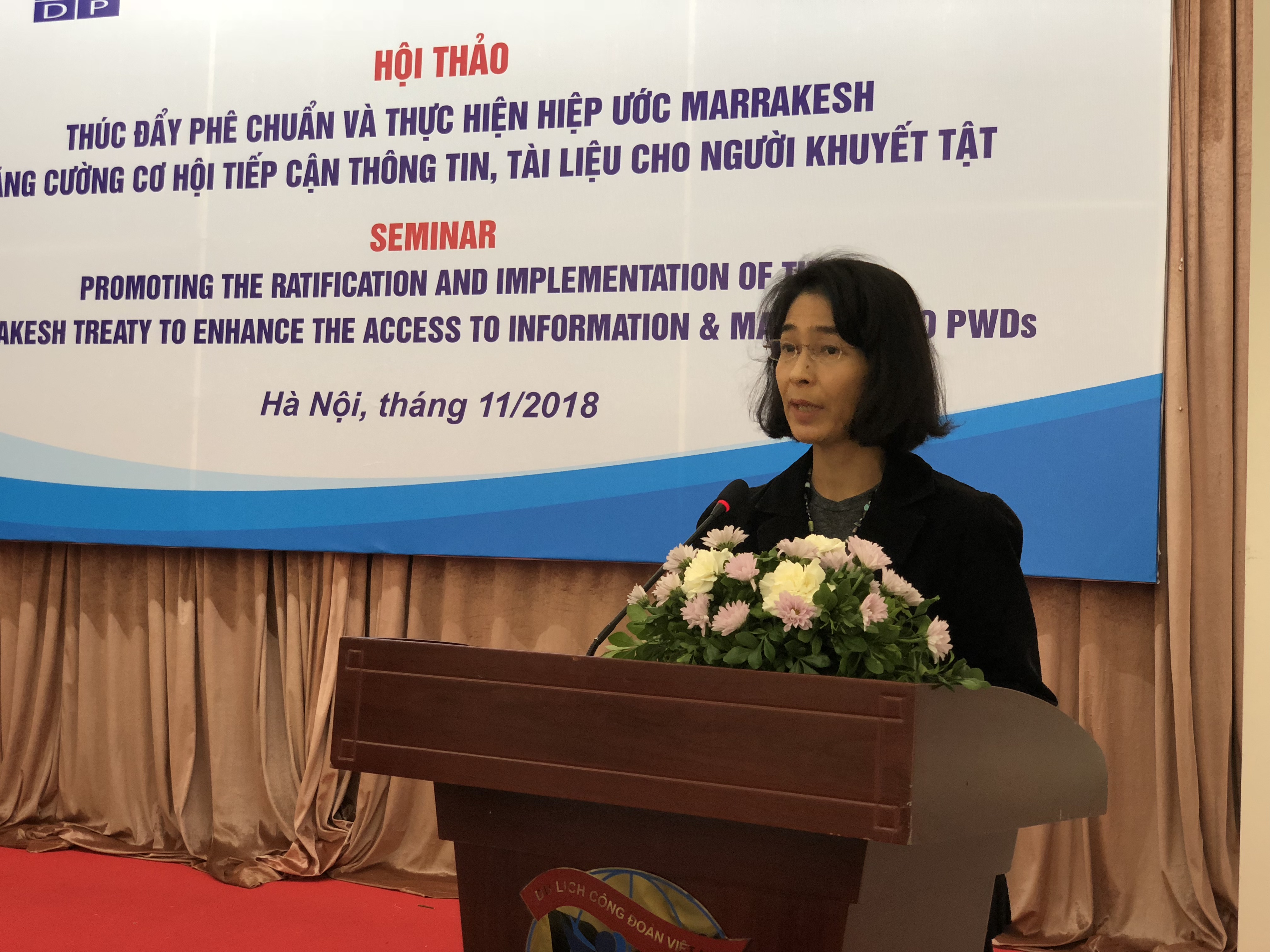Opening Remarks by Ms Akiko Fujii, UNDP Deputy Country Director in Viet Nam.
Promoting the ratification and implementation of the Marrakesh treaty
November 22, 2018
It is a great pleasure to speak at this special occasion.
The Marrakesh Treaty to Facilitate Access to Published Works for Persons Who Are Blind, Visually Impaired, or Otherwise Print Disabled, or the Marrakesh Treaty in short, provides a powerful tool to realize the principle of ‘leaving no one behind’ of the Sustainable Development Goals, or the SDGs.
The Marrakesh Treaty aims to end the ‘book famine.’ The book famine means severe lack of equitable, timely and affordable access to published works in accessible formats, such as braille, audio or electronic books including school textbooks by persons with so-called ‘print disabilities,’ which include persons who are blind and partially sighted.
The book famine prevents persons with print disabilities from making the most of human development opportunities, which can lead to exclusion, poverty, and limited participation in just about any aspect of political, economic and social lives.
Today, in Viet Nam and across societies around the world, persons with disabilities remain among the most excluded and the poorest of the poor, being left behind of economic, social and cultural progress. The prevailing book famine both in and outside Viet Nam is a clear reflection of such reality and a reminder that we need to act.
The Marrakesh Treaty is the second international treaty specifically addressing the rights of persons with disabilities, after the Convention on the Rights of Persons with Disabilities (or CRPD), to which Viet Nam has been a state party since 2015. The Marrakesh Treaty is also the first copyright treaty with human rights principles at its core. Viet Nam now has an opportunity to accede to the Marrakesh Treaty, to take full advantage of the global movements on disability rights.
The Marrakesh Treaty will provide an additional legal framework, policy space and social momentum to accelerate the implementation of the CRPD in Viet Nam. It will pave the way for bringing new partners towards the ‘whole-of-society’ approach to protecting, promoting and fulfilling the rights of persons with disabilities.
It will also create new opportunities to bring out the voice, challenges and celebration of persons with disabilities, and to engage them as active, productive and dignified change agents for social transformation. In other words, by acceding to and implementing the Marrakesh Treaty, Viet Nam will move into a fast-track lane towards sustainable development.
In close partnership with the Government of Viet Nam, communities of persons with disabilities, and development partners, UNDP has been implementing initiatives on disability rights in Viet Nam, particularly from the governance, human rights, and development perspectives.
For example, UNDP is working together with the Government of Viet Nam to enhance its capacity to fulfil its reporting obligations to UN human rights treaties and mechanisms. UNDP contributes to evidence-informed policymaking and advocacy through a research study to assess the extent of stigma and discrimination against persons with disabilities. We also support economic empowerment and legal aid consultations for persons with disabilities, to name just a few examples.
Since the adoption of the Marrakesh Treaty by the world leaders in 2013, UNDP has been supporting national efforts in several countries in Asia to join this historic treaty through knowledge products, capacity building, and technical support for enabling legal environment, as well as the empowerment and engagement of the community of persons with disabilities.
Acceding to and implementing the Marrakesh Treaty are about realizing the fundamental rights of one of the most marginalized populations, about reducing poverty, and about eliminating exclusion to achieve inclusive development, which underpin UNDP’s core corporate visions.
As part of such efforts, UNDP is pleased to have partnered with and supported the Viet Nam Blind Association for the country’s first-ever workshop on the Marrakesh Treaty today. Through this partnership, we have also jointly developed knowledge products on the Marrakesh Treaty, both in print and accessible formats, some of which you may have already come across.
Today’s workshop is a perfect fit for the theme of this year’s International Day of Persons with Disabilities, which will be celebrated in less than 2 weeks on 3 December under the theme of “Empowering persons with disabilities and ensuring inclusiveness and equality.”
With so many participants in this room, this workshop clearly demonstrates Viet Nam’s strong commitment to removing barriers that stand in the way of realizing the full potential and inclusion of persons with disabilities, protecting and fulfilling their basic rights, and creating an inclusive society where no one is left behind.
I would like to conclude by congratulating the Viet Nam Blind Association, the Government of Viet Nam and all the participants in this room for this first national workshop. It is a major step towards Viet Nam’s acceding to and benefiting from the Marrakesh Treaty.
I wish you all a very productive workshop to set a momentum for further action on the ground.

 Locations
Locations




